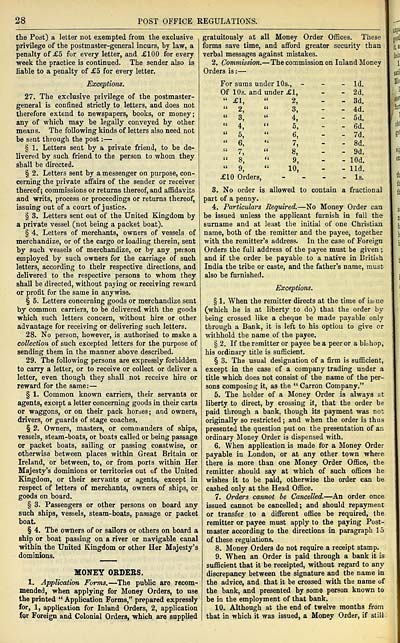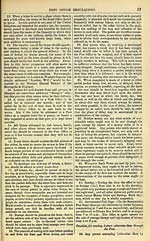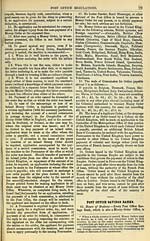Download files
Complete book:
Individual page:
Thumbnail gallery: Grid view | List view

28
POST OFFICE REGULATIONS.
the Post) a letter not exempted from the exclusive
privilege of the postmaster-general incurs, by law, a
penalty of £5 for every letter, and £100 for every
week the practice is continued. The sender also is
liable to a penalty of £5 for every letter.
Exceptions.
27. The exclusive privilege of the postmaster-
general is confined strictly to letters, and does not
therefore extend to newspapers, books, or money;
any of which may be legally conveyed by other
means. The following kinds of letters also need not
be sent through the post : —
§ 1. Letters sent by a private friend, to be de-
livered by such friend to the person to whom they
shall be directed.
§ 2. Letters sent by a messenger on purpose, con-
cerning the private affairs of the sender or receiver
thereof; commissions or returns thereof, and aflSdavits
and writs, process or proceedings or returns thereof,
issuing out of a court of justice.
§ 3. Letters sent out of the United Kingdom by
a private vessel (not being a packet boat).
§ 4. Letters of merchants, owners of vessels of
merchandize, or of the cargo or loading therein, sent
by such vessels of merchandize, or by any person
employed by such owners for the carriage of such
letters, according to their respective directions, and
delivered to the respective persons to whom they
shall be directed, without pajing or receiving reward
or profit for the same in anywise.
I 5. Letters concerning goods or merchandize sent
by common carriers, to be delivered with the goods
which such letters concern, without hire or other
advantage for receiving or delivering such letters.
28. No person, however, is authorised to make a
collection of such excepted letters for the purpose of
sending them in the manner above described.
29. The following persons are expressly forbidden
to carry a letter, or to receive or collect or deliver a
letter, even though they shall not receive hire or
reward for the same: —
§ 1. Common known carriers, their servants or
agents, except a letter concerning goods in their carts
or waggons, or on their pack horses; and owners,
drivers, or guards of stage coaches.
§ 2. Owners, masters, or commanders of ships,
vessels, steam-boats, or boats called or being passage
or packet boats, sailing or passing coastwise, or
otherwise between places within Great Britain or
Ireland, or between, to, or from ports within Her
Majesty's dominions or territories out of the United
Kingdom, or their servants or agents, except in
respect of letters of merchants, owners of ships, or
goods on board.
§ 3. Passengers or other persons on board any
such ships, vessels, steam-boats, passage or packet
boat.
§ 4. The owners of or sailors or others on board a
ship or boat passing on a river or navigable canal
within the United Kingdom or other Her Majesty's
dominions.
MONET OSDEBS.
1. Application Forms. — The public are recom-
mended, when applying for Money Orders, to use
the printed " Application Forms," prepared expressly
for, 1, application for Inland Orders, 2, application
far Foreign and Colonial Orders, which are supplied
gratuitously at all Money Order Offices. These
forms save time, and afford greater security than
verbal messages against mistakes.
2. Commission. — The commission on Inland Money
Orders is : —
For sums
under 10s
_
_
- Id.
Of lOs. and under £1,
_
- 2d.
" £1,
11
2,
_
- 3d.
" 2,
t(
3,
-
- 4d
" 3,
"
4,
_
- 5d.
" 4,
u
5,
-
- 6d
" 6,
11
6,
-
- 7d
" 6,
"
7,
-
- 8d
" 7,
(1
8,
_
- 9d
" 8,
"
9,
-
- lOd
" 9,
(1
10,
-
- lid
£10 Orders,
-
-
- Is.
3. No order is allowed to contain a fractional
part of a penny.
4. Particulars Required. — No Money Order caa
be issued unless the applicant furnish in full the
surname and at least tlie initial of one Christian
name, both of the remitter and the payee, together
with the remitter's address. In the case of Foreign
Orders the full address of tbe payee must be given ;.
and if the order be payable to a native in British
India the tribe or caste, and the father's name, must
also be furnished.
Exceptions.
§ 1. When the remitter directs at the time of isrue
(which he is at liberty to do) that the order by
being crossed like a cheque be made payable only
through a Bank, it is left to his option to give or
withhold the name of the payee.
§ 2. If the remitter or payee be a peer or a bishop,
his ordinary title is sufficient.
§ 3. The usual designation of a firm is sufficient,
except in the case of a company trading under a
title which does not consist of the name of the per-
sons composing it, as the " Carron Company."
5. The holder of a Money Order is always at
liberty to direct, by crossing it, that the order be
paid through a bank, though its payment was not
originally so restricted ; and when the order is thus
presented the question put on the presentation of an
ordinary Money Order is dispensed with.
6. When application is made for a Money Order
payable in London, or at any other town where
there is more than one Money Order Office, the
remitter should say at which of such offices he
wishes it to be paid, otherwise the order can be
cashed only at the Head Office.
7. Orders cannot he Cancelled. — An order once
issued cannot be cancelled; and should repayment
or transfer to a different office be required, the
remitter or payee must apply to the paying Post-
master according to the directions in paragraph 1 5
of these regulations.
8. Money Orders do not require a receipt stamp.
9. When an Order is paid through a bank it is
sufficient that it be receipted, without regard to any
discrepancy between the signature and the name in
the advice, and that it be crossed with the name of
the bank, and presented by some person known to
be in the employment of that bank.
10. Although at the end of twelve months from
that in which it was issued, a Money Order, if still
POST OFFICE REGULATIONS.
the Post) a letter not exempted from the exclusive
privilege of the postmaster-general incurs, by law, a
penalty of £5 for every letter, and £100 for every
week the practice is continued. The sender also is
liable to a penalty of £5 for every letter.
Exceptions.
27. The exclusive privilege of the postmaster-
general is confined strictly to letters, and does not
therefore extend to newspapers, books, or money;
any of which may be legally conveyed by other
means. The following kinds of letters also need not
be sent through the post : —
§ 1. Letters sent by a private friend, to be de-
livered by such friend to the person to whom they
shall be directed.
§ 2. Letters sent by a messenger on purpose, con-
cerning the private affairs of the sender or receiver
thereof; commissions or returns thereof, and aflSdavits
and writs, process or proceedings or returns thereof,
issuing out of a court of justice.
§ 3. Letters sent out of the United Kingdom by
a private vessel (not being a packet boat).
§ 4. Letters of merchants, owners of vessels of
merchandize, or of the cargo or loading therein, sent
by such vessels of merchandize, or by any person
employed by such owners for the carriage of such
letters, according to their respective directions, and
delivered to the respective persons to whom they
shall be directed, without pajing or receiving reward
or profit for the same in anywise.
I 5. Letters concerning goods or merchandize sent
by common carriers, to be delivered with the goods
which such letters concern, without hire or other
advantage for receiving or delivering such letters.
28. No person, however, is authorised to make a
collection of such excepted letters for the purpose of
sending them in the manner above described.
29. The following persons are expressly forbidden
to carry a letter, or to receive or collect or deliver a
letter, even though they shall not receive hire or
reward for the same: —
§ 1. Common known carriers, their servants or
agents, except a letter concerning goods in their carts
or waggons, or on their pack horses; and owners,
drivers, or guards of stage coaches.
§ 2. Owners, masters, or commanders of ships,
vessels, steam-boats, or boats called or being passage
or packet boats, sailing or passing coastwise, or
otherwise between places within Great Britain or
Ireland, or between, to, or from ports within Her
Majesty's dominions or territories out of the United
Kingdom, or their servants or agents, except in
respect of letters of merchants, owners of ships, or
goods on board.
§ 3. Passengers or other persons on board any
such ships, vessels, steam-boats, passage or packet
boat.
§ 4. The owners of or sailors or others on board a
ship or boat passing on a river or navigable canal
within the United Kingdom or other Her Majesty's
dominions.
MONET OSDEBS.
1. Application Forms. — The public are recom-
mended, when applying for Money Orders, to use
the printed " Application Forms," prepared expressly
for, 1, application for Inland Orders, 2, application
far Foreign and Colonial Orders, which are supplied
gratuitously at all Money Order Offices. These
forms save time, and afford greater security than
verbal messages against mistakes.
2. Commission. — The commission on Inland Money
Orders is : —
For sums
under 10s
_
_
- Id.
Of lOs. and under £1,
_
- 2d.
" £1,
11
2,
_
- 3d.
" 2,
t(
3,
-
- 4d
" 3,
"
4,
_
- 5d.
" 4,
u
5,
-
- 6d
" 6,
11
6,
-
- 7d
" 6,
"
7,
-
- 8d
" 7,
(1
8,
_
- 9d
" 8,
"
9,
-
- lOd
" 9,
(1
10,
-
- lid
£10 Orders,
-
-
- Is.
3. No order is allowed to contain a fractional
part of a penny.
4. Particulars Required. — No Money Order caa
be issued unless the applicant furnish in full the
surname and at least tlie initial of one Christian
name, both of the remitter and the payee, together
with the remitter's address. In the case of Foreign
Orders the full address of tbe payee must be given ;.
and if the order be payable to a native in British
India the tribe or caste, and the father's name, must
also be furnished.
Exceptions.
§ 1. When the remitter directs at the time of isrue
(which he is at liberty to do) that the order by
being crossed like a cheque be made payable only
through a Bank, it is left to his option to give or
withhold the name of the payee.
§ 2. If the remitter or payee be a peer or a bishop,
his ordinary title is sufficient.
§ 3. The usual designation of a firm is sufficient,
except in the case of a company trading under a
title which does not consist of the name of the per-
sons composing it, as the " Carron Company."
5. The holder of a Money Order is always at
liberty to direct, by crossing it, that the order be
paid through a bank, though its payment was not
originally so restricted ; and when the order is thus
presented the question put on the presentation of an
ordinary Money Order is dispensed with.
6. When application is made for a Money Order
payable in London, or at any other town where
there is more than one Money Order Office, the
remitter should say at which of such offices he
wishes it to be paid, otherwise the order can be
cashed only at the Head Office.
7. Orders cannot he Cancelled. — An order once
issued cannot be cancelled; and should repayment
or transfer to a different office be required, the
remitter or payee must apply to the paying Post-
master according to the directions in paragraph 1 5
of these regulations.
8. Money Orders do not require a receipt stamp.
9. When an Order is paid through a bank it is
sufficient that it be receipted, without regard to any
discrepancy between the signature and the name in
the advice, and that it be crossed with the name of
the bank, and presented by some person known to
be in the employment of that bank.
10. Although at the end of twelve months from
that in which it was issued, a Money Order, if still
Set display mode to: Large image | Transcription
Images and transcriptions on this page, including medium image downloads, may be used under the Creative Commons Attribution 4.0 International Licence unless otherwise stated. ![]()
| Scottish Post Office Directories > Towns > Glasgow > Post-Office annual Glasgow directory > 1876-1877 > (976) |
|---|
| Permanent URL | https://digital.nls.uk/84441205 |
|---|
| Description | Directories of individual Scottish towns and their suburbs. |
|---|
| Description | Around 700 Scottish directories published annually by the Post Office or private publishers between 1773 and 1911. Most of Scotland covered, with a focus on Edinburgh, Glasgow, Dundee and Aberdeen. Most volumes include a general directory (A-Z by surname), street directory (A-Z by street) and trade directory (A-Z by trade). |
|---|


